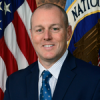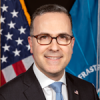Program
 Welcome
Welcome
This year, our focus is on promoting greater awareness of cybersecurity and encouraging information sharing among peers.
As we become increasingly reliant on technology in today’s world, cybersecurity is more important than ever. It remains a top priority for the Department, and it is a journey of continuous improvement, where we must always elevate our game in identifying early and responding quickly to the relentless cyber campaigns, intrusion and exfiltration attempts, and outright attacks against our brand.
The symposium provides an opportunity for top executives from both government and private industry to come together and share insights on cybersecurity trends, issues, and solutions. Throughout the day, our speakers and panelists will discuss a wide range of topics, including artificial intelligence and the cyber workforce. Our program is designed to give our experts a chance to share their insights into current cybersecurity challenges and the future of cybersecurity threats for the next few years.
We welcome your questions and comments and look forward to an engaging and informative day.
Melinda Rogers, U.S. Department of Justice Deputy Assistant Attorney General and Chief Information Officer
Kevin Cox, U.S. Department of Justice Deputy Chief Information Officer
Vu T. Nguyen, U.S. Department of Justice Chief Information Security Officer
Kevin Yasuda, Acting U.S. Department of Justice Deputy Chief Information Security Officer
Agenda
9:00 – 9:05 a.m.
Welcome
Vu T. Nguyen, Chief Information Security Officer, U.S. Department of Justice
9:05 – 9:10 a.m.
National Anthem
Dorothy Fleming Williams, National Anthem Soloist, Accessibility Specialist, Civil Rights Division, U.S. Department of Justice
9:10 – 9:15 a.m.
Opening Remarks
Melinda Rogers, Deputy Assistant Attorney General and Chief Information Officer, U.S. Department of Justice
9:15 – 9:55 a.m.
State of Cybersecurity
Anne Neuberger, Deputy National Security Advisor, The White House
Melinda Rogers, Deputy Assistant Attorney General and Chief Information Officer, U.S. Department of Justice
The federal government must constantly ensure robust and resilient cybersecurity through focused policies and programs. Learn about the current state of cybersecurity and how federal agencies, including DOJ, remain dedicated to maintaining strong cybersecurity.
9:55 – 10:00 a.m.
Break
10:00 a.m. – 10:40 a.m.
Stronger Together: Collaborative Cybersecurity for Resilient National Infrastructure
Brandon Wales, Executive Director, Cybersecurity and Infrastructure Security Agency (CISA), U.S. Department of Homeland Security
Cybersecurity incidents continue to impact organizations across government and industry, with impacts increasingly affecting functions of everyday life. Today, incidents force hospitals to divert patients, prevent school systems from delivering lessons, and render assembly lines unusable. The problem is getting worse, and we need a new approach.
Hear a discussion about current and emerging cybersecurity threats and how these threats require new solutions, supported through whole-of-government initiatives, like the Joint Ransomware Task Force, to ensure that we collectively move faster than our adversaries. The discussion will conclude with how CISA and DOJ can further strengthen their partnership to help catalyze necessary changes needed across the digital ecosystem.
10:40 – 10:45 a.m.
Break
10:45 – 11:25 a.m.
Threat Landscape – Evolution of Critical Threats: Cryptography
Patrick Schneider, Deputy Chief, Encryption Production and Solutions Group, National Security Agency
Adversaries now implement cryptographic algorithms and devices, creating a new cybersecurity risk that continues to evolve. Learn how this critical threat includes the extended use of an obsolete algorithm or device beyond its operational life; the habits and cyber hygiene of end users; the exploitation of cleared defense contractors involved in design/manufacturing of cryptographic devices; and the theft of academic research on cryptography. Find out how cryptography as a threat also increases investment and advancements in high-performance and quantum computing, artificial intelligence (AI), and big data, while impacting key management and foreign influences in international standards bodies.
11:25 – 11:30 a.m.
Break
11:30 – 12:10 p.m.
Perspectives on The Cyber Workforce Strategy
Camille Stewart Gloster, Deputy National Cyber Director, Technology & Ecosystem Security, The White House
Kevin Cox, Deputy Chief Information Officer, U.S. Department of Justice
Investments in workforce development and employment practices have also not kept up with the rapid pace of technological change, leaving a significant mismatch between the available supply and demand for cyber talent across industries. While there have been many initiatives across academia and the public and private sectors to address this increasing demand, we need to find new approaches and make appropriate long-term investments as the gap between cyber workforce demand and supply continues to grow.
12:10 – 12:40 p.m.
Lunch
12:40 – 1:20 p.m.
Social Engineering and Generative AI
Stu Sjouwerman, Chief Executive Officer, KnowBe4
Cybercriminals are more mature than ever in today’s landscape. With the use of modern business models and advanced AI Tools, learn how bad actors are avoiding detection and completing successful attacks. Stu will reveal the most vulnerable industries that fall for attacks and what you can do to strengthen the security culture in your organization.
1:20 – 1:25 p.m.
Break
1:25 – 2:05 p.m.
Cyber Resilience and the Future of Log Management
Gary Steele, Chief Executive Officer, Splunk
Kevin Yasuda, Acting Deputy Chief Information Security Officer, U.S. Department of Justice
This fireside chat will explore the importance of log management in today's digital landscape and enabling organizations to detect and respond to security incidents effectively. The conversation will delve into the key challenges and opportunities facing organizations in this area and examine emerging technologies and strategies that can help enhance log monitoring and management. Attendees can expect to gain insights and actionable advice on how to build more resilient and secure digital infrastructures.
2:05 – 2:10 p.m.
Break
2:10 – 2:50 p.m.
C-SCRM Information Sharing: A Recipe for Resilience
Jeanette McMillian, Assistant Director, Supply Chain and Cyber Directorate, National Counterintelligence and Security Center, Office of the Director of National Intelligence
Understand how Cybersecurity Supply Chain Risk Management (C-SCRM) aims to manage risks to the cyber supply chain, which is among the most critical supply chains as it touches all aspects of government, industry, academia, and the private sector. Learn how C-SCRM information sharing helps thwart cyber threat actors exploiting the cyber supply chain through illicit means. Discover how sharing information on software supply chain attacks; exploited software vulnerabilities; phishing attacks; cyber threat actor’s tactics, techniques, and procedures (TTPs); and cyber campaigns help organizations build cyber resilience. Become aware of new information sharing mechanisms for cybersecurity risk information outlined in the SECURE Technology Act; the establishment of the Director of National Intelligence’s Supply Chain and Counterintelligence Risk Management Task Force; and the cyber breach notifications under Executive Order 14028 that have all increased information sharing to support C-SCRM activities.
2:50 – 2:55 p.m.
Break
2:55 – 3:35 p.m.
Emerging Cyberthreats: An AI Arms Race for Cybersecurity
Bryan Palma, Chief Executive Officer, Trellix
Artificial intelligence (AI) is no longer accessible only to organizations with deep pockets. For example, nefarious actors use ChatGPT software for only $20 a month, and this is only one recent example. As the opportunities and risks of AI are broad and are systemic in nature, today’s emerging cyberthreats are being driven by an increasingly hostile economic and geopolitical landscape and made more foreboding by cybercriminals utilizing generative AI to target organizations and individuals.
Learn how global threat intelligence combined with always-on, always-learning cybersecurity solutions empower organizations across the public and private sectors to counter this emerging breed of cyberthreat.
3:35 – 3:40 p.m.
Break
3:40 – 4:30 p.m.
DOJ Executive Leadership Panel: What Is Your Priority?
Listen to the most pressing concerns Chief Information Officers (CIOs) face as they maintain the balance between keeping critical assets and data safe, while empowering users to be productive for delivering mission success.
Panelists:
Todd Miller, Chief Information Officer, Civil Division
Sonya Thompson, Chief Information Officer, Bureau of Prisons
David Todd, Acting Chief Information Officer, Office of Justice Programs
Moderator:
Melinda Rogers, Deputy Assistant Attorney General and Chief Information Officer, U.S. Department of Justice
4:30 – 4:35 p.m.
Closing Remarks
Vu T. Nguyen, Chief Information Security Officer, U.S. Department of Justice
Presenter and panelist biographies
DOJ is honored to host the following participants in this year's annual symposium.

Ms. McMillian participates in interagency strategic programs and National Security Council initiatives to bolster the security of cyber and supply chains across the federal enterprise. She works closely with NCSC directorates, components of the Office of Director of National Intelligence (ODNI), and other federal departments and agencies, specifically the U.S. Departments of Homeland Security (DHS) and the U.S. Department of Defense (DoD), to address supply chain security as a critical component of the National Counterintelligence Security and National Cyber Strategy.
Before joining NCSC, Ms. McMillian served as the Acting Deputy Inspector General to the Acting Inspector General of the Intelligence Community (IC IG). Ms. McMillian was most familiar with the IC IG office construct having served in various leadership roles since 2010. She was instrumental in the development of the legislation that created the IC IG to provide oversight of IC programs and activities within the authority of the Director of National Intelligence (DNI).
As the Acting Deputy Inspector General, Ms. McMillian partnered with the IC IG to coordinate and supervise independent audits, inspections, investigations, and reviews. She supported the Acting IC IG in supervising the Assistant Inspectors General for Audit, Inspections, Investigations, and Management and Administration. Ms. McMillian also chaired the Deputy Inspectors General Committee that supports the IC IG Forum on several key initiatives, including the IC IG Awards Program.
Ms. McMillian continued to serve as the General Counsel to the IC IG during this interim period, supervising a staff of legal counsels who conducted legal and policy reviews, providing legal guidance on pertinent IG matters, serving as liaison to congressional staff and members, and chairing the IC IG Forum Counsels Committee. Ms. McMillian also was an invited lecturer with the Federal Law Enforcement Training Center, teaching various legal courses, including Workplace Searches (4th Amendment), Civil Investigations, Administrative Remedies, Employee Rights and Warnings (5th Amendment), and Whistleblower Protections.
Ms. McMillian also served in several IC advisory positions before serving in the IG community. At the National Counterterrorism Center (NCTC), Ms. McMillian assisted with the stand-up of the Directorate of Strategic Operational Planning by analyzing the legal and regulatory aspects of strategic counterterrorism plans. As an Assistant General Counsel with the Office of General Counsel at the Central Intelligence Agency, she assisted in the establishment of the ODNI as a legal advisor to the ODNI’s predecessor organization, the IC Community Management Staff.
Ms. McMillian holds a Bachelor of Arts in Political Science (1997) from Howard University and a Juris Doctorate (2000) from Washington University School of Law.

Mr. Miller has been Chief Information Officer (CIO) of the Civil Division since March of 2020. He manages 30 government employees and nearly 200 contract employees while providing IT services to more than 3,200 employees and contractors. He serves as the leader for an IT organization with more than 10 Petabytes of storage and more than 10,000 IT assets.
Mr. Miller joined DOJ in June of 2003. He served as Deputy CIO of the Civil Division before becoming CIO. He also served as the Chief of Engineering, as well as an Information System Security Officer and developer. Mr. Miller is an accomplished IT engineer and project manager with deep knowledge of designing, implementing, and managing virtualized servers, private cloud systems, and advanced network systems. Before joining the government, Mr. Miller worked in healthcare IT.
Mr. Miller holds a Master’s degree in Business Administration from the University of Maryland College Park and a Bachelor’s degree in Computer Science from The Ohio State University.

Ms. Neuberger coordinates the federal government’s cybersecurity efforts. Previously, she served as the National Security Agency’s (NSA) Director of Cybersecurity, where she led NSA’s cybersecurity mission, including emerging technology areas like quantum-resistant cryptography. Before this role, Ms. Neuberger led NSA’s election security effort and served as Assistant Deputy Director of NSA’s Operations Directorate, overseeing foreign intelligence and cybersecurity operations. She also served as NSA’s first Chief Risk Officer, Director of NSA’s Commercial Solutions Center, Director of the Enduring Security Framework cybersecurity public private partnership, and the U.S. Department of the Navy’s Deputy Chief Management Officer. In 2017, Ms. Neuberger was awarded a Presidential Rank Award for her service at the NSA. Before her government service, Ms. Neuberger was Senior Vice President of Operations at American Stock Transfer and Trust Company, where she directed technology and operations.

Mr. Palma manages Trellix’s overall operations, including nearly 5,000 employees and $2B of revenue from more than 40,000 cybersecurity customers. Before becoming CEO, Mr. Palma was Executive Vice President of FireEye where he was responsible for FireEye’s product strategy and led the eventual sale to a consortium led by Symphony Technology Group for $1.2B. Subsequently, he directed the integration and rebranding of McAfee Enterprise and FireEye to form Trellix. He also served as BlackBerry’s President and Chief Operating Officer, Cisco’s Senior Vice President, and General Manager of Americas Customer Experience, Boeing’s Vice President of Cyber and Security Solutions, and PepsiCo’s first Chief Information Security Officer. Mr. Palma is a member of the Board of Directors for TPX Communications.
Mr. Palma holds a Bachelor of Arts from the University of Richmond, Master of Education from the University of Maryland, and Master of Business Administration from Duke University’s Fuqua School of Business.

Mr. Schneider co-leads a diverse team in the design, development, and production of keys, codes, and cryptographic devices that protect the nation’s most critical secrets. His previous responsibilities at NSA was most recently serving as Chief for a computer network operations product group focused on collecting information on those prioritized as the highest level of adversaries to the United States. Previously he served as Deputy Chief, Midpoint Collection Capabilities Development Office, and as Chief, Cyber Security Operations On-net Pursuit Office, where he was responsible for operating NSA’s Cyber Red, Blue, Hunt and Communications Security teams. Mr. Schneider also served as a Senior Operations Officer (SOO) in NSA's National Security Operations Center (NSOC), commonly referred to as “DIRNSA after Dark,” where he led the Global Cryptologic Enterprise. He also helped standup a new intelligence operations center in Germany during an successful overseas assignment. Mr. Schneider also completed a deployment in a hostile area in Afghanistan, and he led NSA’s Cybersecurity Customer Relationships Division, which included leading a Directorates’ support through a Presidential Transition. He also served as Chief of the NSA Red Team, which was awarded the DoD’s Chief Information Officer’s Information Assurance Award for significant accomplishments.
Mr. Schneider holds a Bachelor of Science in Computer Information Systems from the University of Maryland and is a graduate of the Intelligence Community Officer Training Program. He also has completed several graduate-level classes in Leadership and Computer Science.

Mr. Sjouwerman (pronounced “shower-man”) is the founder and CEO of KnowBe4, Inc., a global provider of security awareness training and a simulated phishing platform. He founded KnowBe4 to address the neglected human element of security, to help organizations manage the problem of cybercrime social engineering tactics through new school security awareness training. Mr. Sjouwerman led KnowBe4 through the process of becoming a public company and an IPO on the Nasdaq in April 2021. He facilitated KnowBe4’s acquisition by Vista Equity Partners in late 2022. Along with his CEO duties, he is currently Editor-in-Chief of Cyberheist News, an online magazine tailored to deliver IT security news, technical updates, and social engineering alerts to IT professionals.
Mr. Sjouwerman is a data security entrepreneur with more than 30 years in the IT industry. He was the co-founder of Inc. 500 company Sunbelt Software, a multiple award-winning anti-malware software company that was acquired in 2010. From 1996 through 2011, Mr. Sjouwerman was the Editor-In-Chief of WServer News, an email newsletter to 100,000+ IT system administrators helping them to keep their systems secure.
Mr. Sjouwerman is the author of Cyberheist: The Biggest Financial Threat Facing American Businesses his latest of four books.

Mr. Steele also is a member of Splunk’s board of directors. He brings more than 30 years of experience and a proven track record of successfully scaling software as a service (SaaS) operations and growing multi-billion dollar global enterprises. Before joining Splunk in 2022, Mr. Steele was the founding CEO of Proofpoint, where he led the company’s growth from an early-stage start-up to a leading, publicly traded security-as-a-service provider. He previously served as CEO of Portera and held various leadership roles at Sybase, Sun Microsystems, and Hewlett-Packard. Mr. Steele also served as a member of the board of directors of Upwork, a talent freelancing platform, since 2018. He holds a Bachelor of Science from Washington State University.

Camille Stewart Gloster, Esq. is the Deputy National Cyber Director for Technology & Ecosystem Security for The White House. In her role, Camille leads technology, supply chain, data security, and cyber workforce and education efforts for the Office of the National Cyber Director. Camille is a cyber, technology, and national security strategist and policy leader whose career has spanned the private, public, and non-profit sectors. She joined ONCD from Google, where she most recently served as Global Head of Product Security Strategy, and before that as Head of Security Policy and Election Integrity for Google Play and Android.

Ms. Thompson is responsible for the information technology program for the agency, as well as the Office of Policy and Information Management and the Office of Research and Evaluation. She oversees information technology activities, including the development and support of agency software applications, the management and support of BOP’s networks, the research and evaluation of new security-related technology and equipment and BOP programs, and the development and support of the BOP’s Internet and intranet initiatives. Ms. Thompson also oversees technological solutions for collecting, developing, and disseminating information in an accurate and timely manner to BOP staff, DOJ, Congress, other government agencies, and the public. She serves as the agency's Senior Component Official for Privacy and as a member of the Advisory Policy Board for the Federal Bureau of Investigation’s (FBI's) Criminal Justice Information Services Division (CJIS) Division.
Ms. Thompson began her career with BOP in 1992 as an Honors Attorney, through the Attorney General's Honors Program. She served in positions of increasing responsibility within the agency, including Assistant General Counsel with the Office of General Counsel, Senior Congressional Affairs Specialist in the Office of Congressional Affairs, and Chief of the Information Technology (IT) Planning and Development Branch in the Office of Information Technology. In 2005, Ms. Thompson was appointed as the Deputy Assistant Director for the Information, Policy, and Public Affairs Division (IPPA), then later as the Senior Deputy Assistant Director and BOP Chief Information Officer.
In 2019, she was appointed as the Assistant Director for IPPA, and, in February 2021, she was appointed as the Assistant Director for the Reentry Services Division (RSD). Ms. Thompson was re-appointed as the Assistant Director for IPPA in February 2022 but did not resume the role until September 2022; she served as Acting Chief of Staff for the agency between December 2021 and September 2022. In 2022, IPPA underwent a reorganization and was renamed to the Information Technology and Data Division (ITDD).
Ms. Thompson received her Bachelor of Science degree in Electrical Engineering and her Juris Doctor degree from Washington University in St. Louis, Missouri. She is an International Association of Privacy Professionals (IAPP)-certified privacy professional in the areas of U.S. Government (Certified Information Privacy Professional, or CIPP/G), Technology (Certified Information Privacy Technologists, or CIPT), and Privacy Management (Certified Information Privacy Manager, or CIPM). She has been a member of the Senior Executive Service since 2012.

Mr. Todd has served as the OJP Acting Chief Information Officer since October 2021. He is responsible for strategy, planning, management, and delivery of information technology services for OJP, including DOJ’s grant management system, JustGrants, used by OJP, Community Oriented Policing Services (COPS), and Office on Violence Against Women (OVW).
A 17-year veteran of DOJ, he started with OJP as an information specialist and Deputy Program Manager within the Enterprise Services Staff (ESS) of the Justice Management Division (JMD) Office of the Chief Information Office (OCIO), responsible for delivery of DOJ enterprise, multi-component, and JMD services.
Before Mr. Todd became OJP’s Acting OCIO, he served for five months in the Cybersecurity Services Staff and 18 months as OJP’s Deputy CIO. He has had a variety of leadership assignments in SDS to include application and web services, customer services, and serving as the Deputy SDS Director (Acting).
Previously, Mr. Todd was a service delivery executive for a Fortune 100 firm delivering technology services to a variety of clients in the automotive manufacturing, telecom, transportation, and software industries. As a program delivery executive, he was twice assigned to Critical Response Programs to recover, restore, and transform multi-million-dollar IT delivery services to key clients.
Mr. Todd served for 12 years in the U.S. Army as an officer in command and staff positions in both stateside and overseas postings as a Ranger qualified Master Parachutist and expert infantryman. As an Assistant Professor, he taught Mechanical Engineering Design for three years to cadets at the United States Military Academy (USMA) at West Point.
Mr. Todd’s education includes a Bachelor of Science Degree with dual areas of concentration in Mathematics and Military History from the United States Military Academy, a Master of Science Degree in Mechanical Engineering from Stanford University, and a certificate in IT Project Management from George Washington University. He is a graduate of the Federal Executive Institute.

Mr. Wales is responsible for leading long-term strategy development, managing CISA-wide policy initiatives, and ensuring effective operational collaboration across the agency.
On February 20, 2022, the Secretary of Homeland Security appointed Mr. Wales as the Senior Response Official for domestic preparedness and response to the current Russia-Ukraine crisis after President Biden designated DHS as the lead federal agency on domestic preparedness and response.
From November 17, 2020, through July 12, 2021, he was designated as the Acting Director of CISA. In this capacity, he oversaw CISA’s efforts to defend civilian networks, manage systemic risk to national critical functions, and work with stakeholders to raise the security baseline of the Nation’s cyber and physical infrastructure.
Mr. Wales previously served as the Senior Counselor to the Secretary for Cyber and Resilience, the Acting Chief of Staff of the Department and as the Director of the DHS Office of Cyber and Infrastructure Analysis (OCIA), which provided integrated analysis of cyber and physical risks to the nation’s critical infrastructure. When DHS began working on the first Quadrennial Homeland Security Review in 2009, Mr. Wales was asked to lead the review of the counterterrorism and cybersecurity mission areas.
Mr. Wales’s contributions have been recognized with an Exceptional Performance Award from the Director of National Intelligence, a DHS Secretary’s Award for Excellence, and two DHS Distinguished Service Medals, DHS’s highest civilian award.

Ms. Williams ensures compliance with accessibility standards in the Disability Rights Section, Civil Rights Division. In addition to her career at DOJ, she supports multiple local ministries with her vocal performance talent, and performs the national anthem, as well as other musical tributes, at official events of federal agencies.
She is a member and soloist for multiple ministries in the Baltimore-Washington, D.C., metro area, including the City Temple of Baltimore Baptist, the Madison Avenue Presbyterian Church (Baltimore), the Sharon Baptist Church (Washington, D.C.), the St. Peter Claver/St. Pius V Catholic Church (Baltimore), as well as The Community Concert Choir of Baltimore and The Olton Singing Society (Baltimore, Maryland), among others. Her support to ministries also has included St. John A.M.E. Church (Baltimore), where she was a member for more than 20 years, serving as director for the Ebony Male Chorus, Mass Choir, and the Tots Choir.
Host biographies
DOJ cybersecurity leadership thanks all attendees for their participation in this year's annual symposium.
Ms. Rogers oversees DOJ’s $3.1 billion information technology (IT) portfolio, providing strategic direction to DOJ components and directly supporting mission operations through IT service delivery, as well as DOJ’s cybersecurity program to proactively mitigate and monitor risks associated with the acquisition, management, and security of technology assets. Previously, she served as Deputy Chief Information Officer, and earlier as Chief Information Security Officer. Before joining DOJ, she was Equifax’s Assistant Vice President for Fraud Prevention and Identity Verification Solutions. Ms. Rogers holds a Master's of Business Administration from Emory University and is an alumna of George Mason University.
Kevin Cox is the Deputy Chief Information Officer for the U.S. Department of Justice (DOJ). In this position, Mr. Cox oversees all mission and functional activities required to support the Office of the Chief Information Officer, including service delivery, security, finance and budget, and policy. Prior to his current role, Mr. Cox served as Program Manager for the federal Continuous Diagnostics and Mitigation (CDM) Program within the Cybersecurity and Infrastructure Security Agency (CISA) within the U.S. Department of Homeland Security, as well as the Deputy Chief Information Security Officer (CISO) at the DOJ. Mr. Cox holds M.A. degrees from West Virginia University and the University of Chicago.
Mr. Nguyen manages cybersecurity operations, including architecture, compliance, engineering, and risk. Previously he served at the U.S. Department of Homeland Security, including the Cybersecurity Operations Division and the U.S. Citizenship and Immigration Services. Mr. Nguyen holds a Master of Science in Telecommunications focused on cybersecurity and computer forensics from George Mason University.

Mr. Yasuda manages a team of cybersecurity experts who specialize in protecting the Department through security operations, risk and compliance, and architecture and engineering. In addition, he serves as the Assistant Director leading the Justice Security Operations Center, providing DOJ Components and government customers network monitoring, incident response, and cyber threat intelligence collection. Kevin has been with the Department for 14 years serving in numerous cybersecurity roles.

 U.S. Department
of Justice
U.S. Department
of Justice